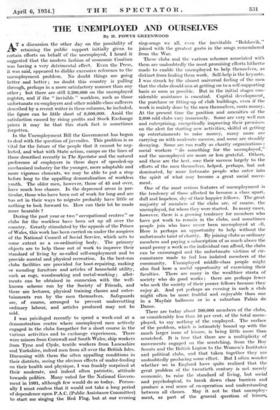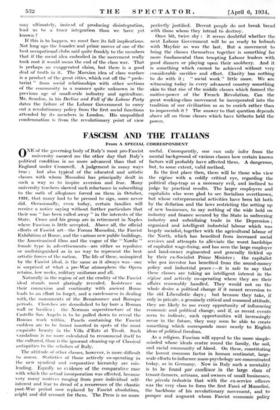THE UNEMPLOYED AND OURSELVES
By H. POWYS GREENWOOD
A T a discussion the other day on the possibility of .LA!• retaining the public support initially given to certain efforts on behalf of the unemployed, I heard it suggested that the modern fashion of economic Coueism was having a very detrimental effect. Even the Press, it was said, appeared to dislike excessive reference to the unemployment problem. No doubt things are going better and better ; no doubt this country is pulling through, perhaps in a more satisfactory manner than any other ; but there are still 2,200,000 on the unemployed register, and if the " invisible " workless, such as those unfortunate ex-employers and other middle-class sufferers described by a recent writer in these columns, be included, the figure can be little short of 3,000,000. Amid the satisfaction caused by rising profits and Stock Exchange prices it may be that this stark fact is sometimes forgotten.
In the Unemployment Bill the Government has begun to deal with the question of juveniles. This problem is so vital for the future of the people that it cannot be neg- lected, and what with State action; camps on the lines of those described recently in The Spectator and the natural preference of employers in these days of speeded-up mechanized industry for the younger, more adaptable and more 'vigorous elements, we may be able to put a stop before long to the appalling demoralization of workless youth. The older men, however, those of 45 and over, have much less chance. In the depressed areas in par- ticular, those who have been out of work for long and are too set in their ways to migrate probably have little or nothing to look forward to. How can their lot be made more bearable ?
During the past year or two "occupational centres" or clubs for the workless have been set up all over the country. Greatly stimulated by the appeals of the Prince of Wales, this work has been carried on under the auspices of the National Council of Social Service, which acts to some .extent as a co-ordinating body. The primary objects are to help those out of work to improve their standard of living by so-called self-employment and to provide mental and physical recreation. In the best-run clubs facilities are provided for boot-repairing, making or mending furniture and articles of household utility, such as rugs, woodworking and metal-working ; allot- ments can be obtained in connexion with the well- known scheme run by the Society of Friends, and there are lectures, physical training classes and enter- tainments run by the men themselves. Safeguards are, of course, arranged to prevent undercutting ordinary labour, and articles produced may not be sold.
I was privileged recently to spend a week-end at a demonstration centre where unemployed men actively engaged in the clubs foregather for a short course in the various activities and to exchange experiences. There were miners froin Cornwall and South Wales, ship workers from Tyne and Clyde, textile workers from Lancashire and Yorkshire, indeed men from all over the British Isles. Discussing with them the often appalling conditions in their districts, seeing the obvious effects of under-feeding on their health and physique, I was frankly surprised at their moderate, and indeed often patriotic, attitude towards politics. Many voted for the National Govern- ment in 1931, although few would do so today. Person- ally I must confess that it would not take a long period of dependence upon P.A.C. (Public Assistance Committee) to start me singing the Red Flag, but at our evening sing-songs we all, even the inevitable "Bolshevik," joined with the greatest gusto in the songs remembered from the War.
These clubs and the various schemes associated with them are undoubtedly the most promising efforts hitherto made to enable the unemployed to help themselves, as distinct from finding them work. Self-help is the keynote. I was struck by the almost universal feeling of the men that the clubs should aim at getting on to a self-supporting basis as soon as possible. But in the initial stages con- siderable assistance is essential. Capital development, the purchase or fitting-up of club buildings, even if the work is mainly done by the men themselves, costs money. At the present time the position and amenities of the 2,000 odd clubs vary immensely. Some are very well run and enterprising, energetically improving their premises, on the alert for starting new activities, skilful at getting up entertainments to raise money, many more are carrying on with moderate success, and some are steadily decaying. Some are run really as charity organizations ; social workers " do something for the unemployed," • and the unemployed are more or less grateful. Others, and these are the best, owe their success largely to the efforts of the men themselves, helped, perhaps, 'but not dominated, by more fortunate people who enter into the spirit of what may become a great social move- ment.
One of the most serious features of unemployment is the tendency of those affected to become a class apart, dull and hopeless, shy of their happier fellows. The great majority of members of the clubs are, of course, the unemployed, for whom they were started. In many cases, however, there is a growing tendency for members who have got work to remain in the clubs, and sometimes people join who have never been unemployed at all.
Here is perhaps an opportunity to help without the unfortunate taint of charity. By joining clubs as ordinary members and paying a subscription of as much above the usual penny a week as the individual can afford, the clubs can be encouraged and the unfortunate victims of cir- cumstance made to feel less isolated members of the community. Unemployed middle-class people might also find here a useful opportunity of exercising their faculties. There are many in the wealthier strata of society who do good works ; there are perhaps fewer who seek the society of their poorer fellows because they enjoy it. And yet perhaps an evening in such a club might often be more fruitful and enjoyable than one in a Mayfair ballroom or in a suburban Palais de Danse.
There are today about 200,000 members of the clubs, or considerably less than 10 per cent. of the total unem- ployed, to say nothing of the employed. The surface of the problem, which is intimately bound up with the much larger issue of leisure, is being little more than scratched. It is true that there are a multiplicity of movements engaged on the scratching, from the Boy Scouts and the British Legion to the Women's Institutes and political clubs, and that taken together they are undoubtedly producing some effect. But I often wonder whether we in England have quite realized that the great problem of the twentieth century is not merely economic, to raise the standard of living, but social and psychological, to break down class barriers and produce a real sense of co-operation and understanding between all classes. May it not be that unemploy- ment, as part of the general question of leisure, may ultimately, instead of producing disintegration, lead us to a truer integration than we have yet known ?
If this is to happen, we must face its full implications. Not long ago the founder and prime mover of one of the best occupational elubs said quite frankly to the members that if the social idea embodied in the movement really took root it would mean the end of the class war. That is perhaps an exaggerated claim, but there is a good deal of truth in it. The ;Martian idea of class warfare is a product of the great cities, which cut off the " prole- tariat " from social relationships with other sections of the community in a manner quite unknown in the previous age of small-scale industry and agriculture. Mr. Scanlon, in his Decline and Fall of the Labour Party dates the failure of the Labour Government to carry out a revolutionary policy from the first social functions attended by its members in London. His unqualified condemnation is from the revolutionary point of view perfectly justified. Decent. people do not break bread with those whom they intend to destroy.
Once bit, twice shy : it seems doubtful whether the next Labour Government will be as ready to hobnob with Mayfair as was the • last. But a movement to bring the classes theinselves together is something- far more fundamental than tempting Labour leaders with good dinners or playing- upon their snobbery. And it is something which cannot be achieved without very considerable sacrifice and effort. Charity has nothing to do with it ; " social work " little more. We are witnessing today in every advanced country - something akin-to that rise of the middle classes which formed the motive-power of the French Revolution. Can the great working-class movement be incorporated into the tradition of our civilization so as to enrich rather than to impoverish it ? The answer to that question depends above all on those classes which have hitherto held the power.









































 Previous page
Previous page